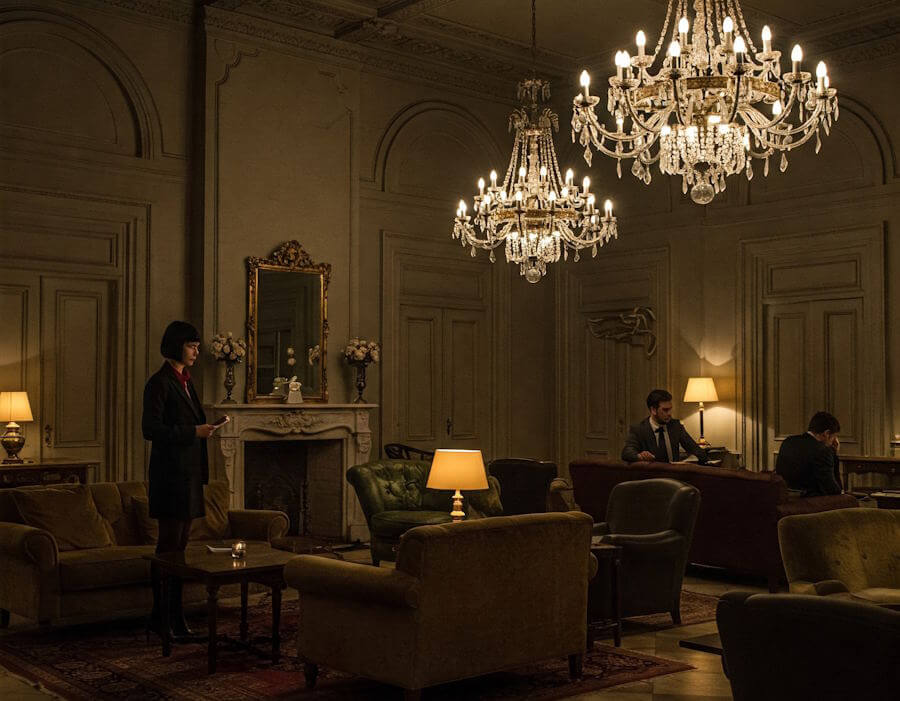What Defines a Boutique Hotel?
Boutique hotels are distinct entities within the hospitality industry, characterized by their unique blend of style, design, and personalized service. Unlike traditional, larger hotel chains that often prioritize standardization and mass appeal, boutique hotels harness individuality and charm as foundational elements of their identity. One of the most significant aspects that set these establishments apart is their size; typically, boutique hotels feature a limited number of rooms, often ranging from a mere ten to a hundred. This smaller scale fosters an intimate environment that encourages personal interactions between guests and staff, creating a sense of belonging and comfort.
The design and aesthetic of boutique hotels also play a crucial role in defining their character. Each hotel typically boasts a distinctive theme or design that reflects the local culture, history, or art. This immersive decor enhances the overall guest experience, providing a visual narrative that tells a story and enriches stays with local flavor. From luxurious furnishings to eye-catching artwork, every element within a boutique hotel is meticulously curated to create a uniquely cohesive atmosphere.
Furthermore, personalized service is a hallmark of boutique hotels. Staff members often go beyond the usual levels of hospitality, taking the time to understand guests’ preferences and needs, which can result in tailor-made experiences. Whether it’s offering recommendations for local attractions, organizing personalized activities, or providing unique amenities, these hotels prioritize making every stay memorable. The combination of thoughtful service and unique aesthetics not only distinguishes boutique hotels from larger chains but also cultivates an authentic travel experience that is often sought after by discerning travelers. In the nuances of style, design, and service, boutique hotels embody a charm and personalized touch that invites guests to immerse themselves in their surroundings.
The History of Boutique Hotels
The concept of boutique hotels emerged in the early 1980s as a response to the rising demand for more personalized and unique travel experiences. This movement represented a shift away from the more standardized accommodations offered by large hotel chains. Unlike conventional hotels, boutique hotels emphasized individuality, offering distinctive atmospheres, tailored services, and a focus on local culture and aesthetic appeal. One of the earliest examples of a boutique hotel is the Morgans Hotel in New York City, which opened in 1984. Designed by Ian Schrager and Steve Rubell, it set the precedent for a new style of hospitality that blended luxury with a home-like atmosphere.
Throughout the late 1980s and early 1990s, boutique hotels began to gain traction, particularly in urban centers known for their artistic and cultural significance. Influential figures in the industry, such as hotelier André Balazs, further propelled the trend with properties like the Mercer in Manhattan, emphasizing design and exclusivity. This period witnessed a burgeoning interest in design-centric experiences, drawing inspiration from art, architecture, and fashion, which became integral to the boutique brand identity.
The turn of the millennium marked another significant milestone in the evolution of boutique hotels. As global travel increased, the demand for unique accommodations surged, leading to a proliferation of such establishments worldwide. Recognizing the appeal of boutique hotels among discerning travelers, major hospitality companies began to invest in and acquire boutique brands. As a result, many boutique hotels developed enhanced amenities and services while still maintaining their unique character.
Today, the boutique hotel landscape continues to flourish, characterized by diverse offerings that cater to various consumer preferences. The focus remains on creating memorable experiences that reflect local culture and artistry, making boutique hotels a vital part of the contemporary hospitality industry.
Why Choose a Boutique Hotel Over a Chain?
The choice between a boutique hotel and a large chain is increasingly becoming a topic of interest among travelers seeking a distinctive experience. Boutique hotels, characterized by their smaller size and unique charm, present numerous advantages that make them an appealing alternative for discerning guests. At the forefront of these benefits is personalized service. Unlike large hotel chains, which often standardize guest interactions, boutique hotels prioritize individual experiences. Staff members frequently develop close relationships with guests, ensuring attentive service tailored to specific needs, preferences, and desires.
Another significant advantage of boutique hotels lies in their commitment to authenticity and unique design. Many boutique establishments reflect local architecture and culture, offering a sense of place that is often missing in chain hotels. This authentic atmosphere allows travelers to feel more connected to their surroundings, enhancing their overall travel experience. The décor and amenities are often thoughtfully curated, providing a visually stimulating environment that encourages relaxation and exploration. This attention to detail can create lasting memories and contribute to the overall appeal of the trip.
Moreover, boutique hotels frequently curate unique experiences that immerse guests in local culture. This can include guided tours led by knowledgeable locals, cooking classes featuring regional cuisine, or workshops that showcase traditional crafts. Such activities help travelers develop a deeper understanding and appreciation of the destination, fostering a richer connection to the locales they visit. Many boutique hotels are also situated in vibrant neighborhoods, allowing guests to explore hidden gems, local eateries, and cultural landmarks that might be overlooked when staying in a standard hotel chain.
In summary, opting for a boutique hotel provides numerous advantages, including personalized service, unique design authenticity, and opportunities for local culture immersion. These elements combine to create a distinctive travel experience that is often lacking in larger hotel chains, encouraging discerning travelers to consider boutique accommodations for their next adventure.
Top Boutique Hotels Around the World
Boutique hotels offer travelers an intimate and personalized experience, often reflecting the local culture and charm of their location. From the vibrant streets of Paris to the tranquil shores of Bali, here are several exemplary boutique hotels that standout for their unique features and distinctive amenities.
In Europe, the Hotel Amour in Paris captures the essence of romance with its eclectic design and intimate atmosphere. This charming hotel, situated in the trendy 9th arrondissement, boasts art-filled rooms and an inviting courtyard that encourages relaxation. Guests can also enjoy a rooftop terrace with picturesque views of the city’s skyline, making it an ideal retreat for both leisure and exploration.
In South America, Palacio de Sal in Bolivia presents a truly unique experience. Constructed entirely from salt blocks, this hotel offers rooms with stunning views of the Salar de Uyuni, the world’s largest salt flat. Visitors can embark on extraordinary excursions to witness the breathtaking landscapes while enjoying the warm hospitality and unique dining experiences provided by the hotel.
On the other side of the world, the Sensei Lanai, A Four Seasons Resort in Hawaii is a testament to wellness and tranquility. This boutique hotel features luxurious accommodations alongside wellness retreats complete with personalized programs for relaxation and rejuvenation. Guests partake in outdoor activities such as hiking and yoga, enhancing their connection with nature while indulging in gourmet local cuisine.
Meanwhile, in Asia, the Brewery Hotel in Singapore combines chic urban design with historical relevance. Housed in a restored brewery, this hotel pays homage to its past while providing guests with modern comforts. It features several bars and restaurants, each with a curated selection of local flavors, alongside art installations that reflect Singapore’s rich cultural landscape.
These boutique hotels exemplify unique travel experiences that cater to individual preferences, making them ideal choices for discerning travelers seeking a memorable getaway. Their distinctive characteristics reinforce the allure of boutique accommodations, promising a stay that transcends the conventional hotel experience.
The Role of Design in Boutique Hotels
The design of boutique hotels plays a pivotal role in creating a unique travel experience, distinct from traditional accommodations. Unlike large hotel chains, boutique hotels often focus on individualism and personality, reflecting the local culture, history, and ambiance. This attachment to design begins with architecture—each property is usually situated in a notable building or landscape that embodies the essence of its surroundings. Whether it is a renovated historical structure or a modern masterpiece, the architecture sets the stage for what guests can expect.
Interior design further enhances this immersive experience. Each room and common area is thoughtfully curated to represent local craftsmanship and artistry. Typically, boutique hotels will incorporate elements such as locally sourced materials, artisan decor, and regional art, which allows guests to connect with the destination on a deeper level. The color schemes, furniture choices, and layout are intentional, often reflecting the community’s aesthetic and cultural narrative. For instance, a coastal boutique hotel may utilize light, airy colors and natural textures reminiscent of the beach, inviting guests to relish in the locale’s vibe.
In addition to aesthetics, functionality is key in the design of boutique accommodations. Spaces are adapted to foster social interaction or offer private retreats, catering to various guest preferences. Common areas often encourage mingling and incorporate inviting settings such as lounges and cafes, where travelers can share stories and experiences. The unique blend of design elements not only contributes to visual appeal but also directly impacts guest satisfaction. Attention to detail ensures that the guest experience is filled with surprise and delight, making their stay memorable.
Ultimately, the design of boutique hotels is much more than interior decoration; it is a curated reflection of the locale that enhances the entire travel experience, making visitors feel a part of the culture they resonate with.
Sustainability and Boutique Hotels
The boutique hotel industry has increasingly embraced sustainability as a core principle, driven by traveler demand for more eco-conscious options. Small-scale establishments often prioritize environmentally friendly practices that not only reduce their carbon footprint but also contribute positively to local communities. This commitment to sustainability is reflected in various innovative practices that boutique hotels have adopted.
One prominent method employed by boutique hotels is the sourcing of local products and services. By partnering with regional suppliers for food, beverages, and furnishings, these hotels support local economies while reducing transportation emissions associated with importing goods. This practice not only enhances the guest experience by providing authentic local flavors and artisanal craftsmanship but also fosters a sense of community connection.
In addition to local sourcing, many boutique hotels are implementing eco-friendly infrastructure initiatives. This includes utilizing renewable energy sources such as solar panels and energy-efficient appliances, reducing water waste through advanced plumbing fixtures, and implementing robust recycling programs. The design of these hotels often incorporates sustainable materials, promoting an overall aesthetic that harmonizes with the natural environment.
Furthermore, boutique hotels frequently engage guests in sustainability efforts, encouraging them to be mindful of their environmental practices. Many establishments offer educational workshops on local conservation issues, sponsor community clean-up events, or even provide incentives for guests who choose to forgo daily housekeeping. Such initiatives not only demonstrate a hotel’s commitment to sustainability but also empower travelers to participate in eco-friendly practices during their stay.
Through these collective efforts, boutique hotels are not just offering unique travel experiences; they are also setting new standards for hospitality rooted in sustainability. As the awareness of environmental issues continues to grow, it is likely that these innovative practices will become increasingly integral to the boutique hotel experience.
Guest Experiences: What to Expect
Boutique hotels are renowned for their distinctiveness and the personalized experiences they offer to guests. Unlike traditional hotels, which often favor a standardized approach, boutique accommodations focus on creating a unique atmosphere that reflects the character of the local area. From the moment guests arrive, they can anticipate a warm welcome often accompanied by personalized services that cater to individual needs and preferences. This approach to hospitality makes every stay memorable, fostering a sense of belonging and community.
One of the signature features of boutique hotels is their emphasis on curated activities that allow guests to immerse themselves in the local culture. Many boutique hotels offer expertly designed itineraries, not just for relaxation but also for exploration, providing access to hidden gems in the surrounding vicinity. Guests may find themselves enjoying wine tastings at local vineyards, guided tours of historical landmarks, or cooking classes featuring regional cuisine. These experiences often highlight the uniqueness of the destination, setting boutique hotels apart from larger chains.
Furthermore, guest testimonials consistently reflect high satisfaction rates. Many travelers report that their stay at a boutique hotel felt more like visiting a friend’s home rather than a mere lodging experience. For instance, a traveler staying at a boutique hotel in Paris remarked on the personalized attention received from the staff: “They knew my name within hours and offered tailored recommendations that truly made my visit special.” Such stories underscore the notion that boutique hotels prioritize guest relationships, enhancing their overall travel experience.
Ultimately, guests can expect not just accommodation, but a thoughtfully crafted experience that stays with them long after their departure, as boutique hotels strive to leave a lasting impression through exceptional service and unique offerings.
Tips for Finding the Perfect Boutique Hotel
Choosing the right boutique hotel can significantly enhance your travel experience, as these establishments often provide unique characteristics and a personalized touch that traditional hotels may lack. To find the perfect boutique hotel tailored to your preferences, several strategies can be employed.
Firstly, prioritizing research is paramount. Utilize online travel platforms and specialized review sites to gather insights into potential accommodations. Pay attention to guest feedback regarding service quality, cleanliness, and overall ambiance. Furthermore, consider looking for detailed descriptions and photographs from previous visitors, which can help paint a clearer picture of what to expect.
Location is another crucial factor when selecting a boutique hotel. Assess whether the hotel is situated in a vibrant neighborhood conducive to your interests and activities. Proximity to major attractions, restaurants, and public transport can greatly enhance your experience. A strategically chosen location allows you to explore the culture and vibrancy of your destination more effortlessly.
Evaluating available amenities is equally important. Boutique hotels often distinguish themselves with unique features – be it a rooftop terrace, personalized concierge services, or in-house dining options. Determine which amenities align with your travel needs, be it wellness facilities, complimentary breakfast, or pet-friendly policies. These amenities can greatly elevate the overall experience, making it more enjoyable and tailored to your desires.
Lastly, don’t underestimate the significance of the booking process. Avoid last-minute reservations, as boutique hotels tend to fill up quickly, especially during peak seasons. Consider booking well in advance to secure the best rates and room selections. Additionally, do not shy away from reaching out to the hotel directly to inquire about any special promotions or packages that may not be advertised online.
By following these tips, you can successfully navigate the boutique hotel landscape and find an ideal lodging option that complements your travel aspirations.
The Future of Boutique Hotels
The boutique hotel industry is poised for significant evolution as travel preferences and consumer behaviors continue to shift. As travelers become increasingly discerning, the emphasis on personalized, immersive experiences is expected to intensify. Boutique hotels, known for their individualized services and distinct aesthetics, align well with this trend, catering to an audience seeking authenticity and uniqueness in their accommodations.
A notable trend emerging within the boutique hotel sector is the integration of technology to enhance guest experiences. Innovations such as smart room features, mobile check-ins, and personalized digital concierge services are gradually becoming standard offerings. These advancements not only streamline operations but also allow guests to tailor their stays according to their preferences, deepening their connection with the venue.
Moreover, sustainability stands out as a crucial theme influencing the future landscape of boutique hotels. As awareness of environmental issues grows, travelers are increasingly inclined to choose accommodations that prioritize eco-friendly practices. Boutique hotels are responding by implementing sustainable initiatives such as reducing energy consumption, sourcing local food, and using sustainable materials. This commitment to sustainability is not just a trend but an essential criterion for many travelers, aligning the sector with wider global movements toward sustainability.
However, challenges lie ahead for boutique hotels. The increasing competition from alternative lodging options, such as short-term rentals, is one of the primary concerns. To distinguish themselves, boutique hotels must continue to innovate and offer unique experiences that cannot be replicated elsewhere. In addition, the economic uncertainties and fluctuations in travel demand may require these establishments to adapt quickly in order to thrive.
In conclusion, the future of boutique hotels appears bright, characterized by a blend of personalized service, sustainable practices, and innovative technologies. By focusing on these aspects, boutique hotels can continue to attract and retain the modern traveler who seeks a unique and memorable experience. The ability to adapt to emerging trends and consumer preferences will ultimately shape the trajectory of the boutique hotel industry in the coming years.




